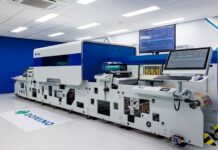In the context of Industry 4.0, AI (Artificial Intelligence) and ML (Machine Learning) are dominating trends in packaging robotics and automation. AI involves training software to execute specific tasks rather than relying on explicit programming. On the other hand, ML deploys algorithms to learn insights and identify patterns from data, employing this knowledge to make increasingly informed decisions.
An insight highlights the rapid proliferation of AI-based solutions in the packaging sector. Projections indicate that the utilization of AI in packaging is poised to grow at Compound Annual Growth Rates (CAGRs) exceeding 50% over the next five years.
Deep Learning Robotics (DLRob) recently introduced groundbreaking robot control software designed for compatibility with various robotic platforms. This innovative software enables users to teach robots tasks in an intuitive way—by demonstrating the activity. DLRob’s advanced ML algorithms facilitate robot learning through observation and imitation of human actions. With a user-friendly interface and adaptability to a range of applications, DLRob’s software democratizes the ability to teach robots new tasks, spanning industrial manufacturing to home automation.
Expanding its capabilities, DLRob announced in April that it supports additional hardware devices through a software update, broadening its customer base to control a wider array of robotics devices, including Universal Robots’ UR series of collaborative robots (cobots).
During the automatica 2023 trade show in Germany, Intrinsic (an Alphabet company) and Siemens unveiled a collaboration aimed at integrating Intrinsic’s AI-based robotics software with Siemens Digital Industries’ portfolio for industrial production automation. The goal is to bridge the existing gaps between the development paradigms of AI-based robotics and automation components. This partnership seeks to streamline the process of deploying advanced robotic capabilities such as robot manipulation, pose estimation, and automated path planning. The ultimate objective is to expedite the creation and operation of adaptable, AI-enhanced robot work cells, making industrial robotics more accessible to businesses, entrepreneurs, and developers, particularly SMEs.
Partnering with a technology leader opens the door to collectively unveiling solutions that empower businesses to leverage the advantages of robotics and automation.




























